Abstract
Molecular studies were performed on 101 cases of confined placental mosaicism (CPM) involving autosomal trisomy. The origin of the trisomic cell line was determined in 54 cases (from 51 pregnancies), 47 of which were also analyzed for the presence of uniparental disomy (UPD) in the disomic cell line. An additional 47 cases were analyzed for parental origin in the disomic cell line only. A somatic (postmeiotic) origin of the trisomy was observed in 22 cases and included the majority of cases with CPM for trisomy 2, 7, 8, 10, and 12. Most cases of CPM involving trisomy 9, 16, and 22 were determined to be meiotic. Fetal maternal UPD was found in 17 of 94 informative CPM cases, involving trisomy 2 (1 case), 7 (1 case), 16 (13 cases), and 22 (2 cases). The placental trisomy was of meiotic origin in all 17 cases associated with fetal UPD (P = .00005). A meiotic origin also correlated with the levels of trisomy in cultured chorionic villi samples (CVS) (P = .0002) and trophoblast (P = .00005). Abnormal pregnancy outcome (usually IUGR) correlated with meiotic origin (P = .0003), the presence of fetal UPD (P = 4 x 10(-7)), and the level of trisomy in trophoblast (P = 3 x 10(-7)) but not with the level of trisomy in CVS or term chorion. The good fit of somatic errors with the expected results could have been observed only if few true meiotic errors were misclassified by these methods as a somatic error. These data indicate that molecular determination of origin is a useful predictor of pregnancy outcome, whereas the level of trisomy observed in cultured CVS is not. In addition, UPD for some chromosomes may affect prenatal, but not postnatal, development, possibly indicating that imprinting effects for these chromosomes are confined to placental tissues.
Full text
PDF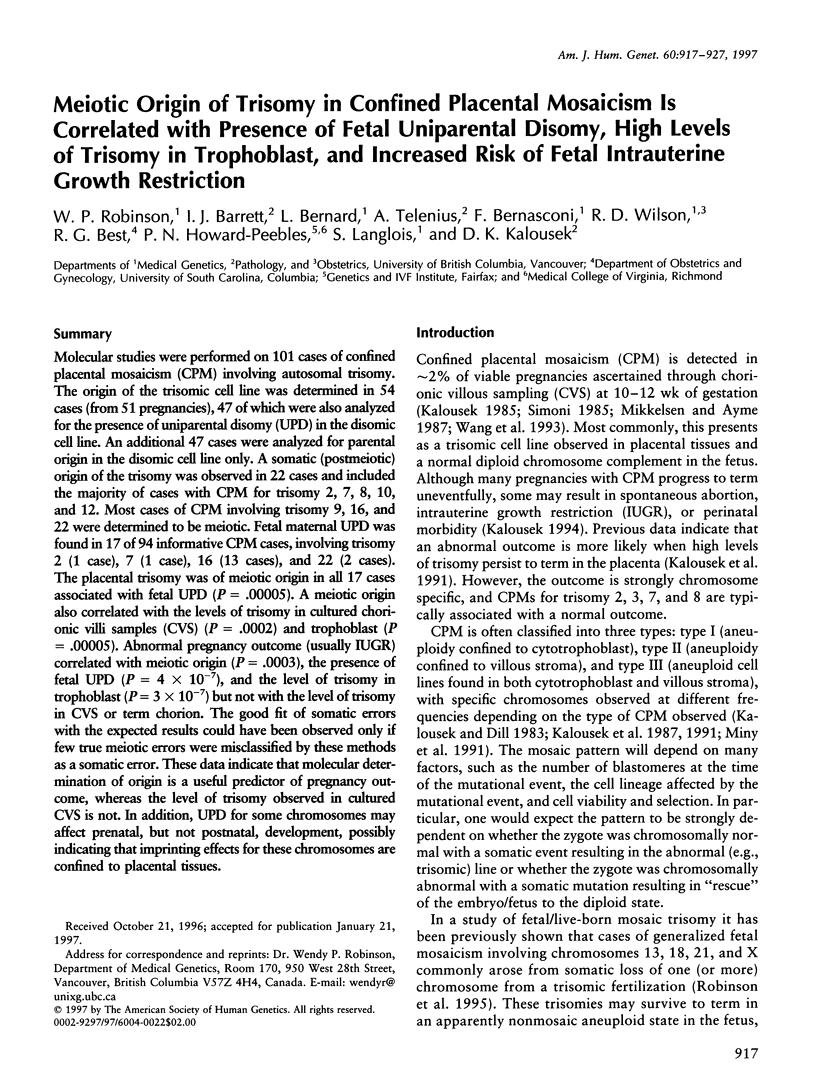
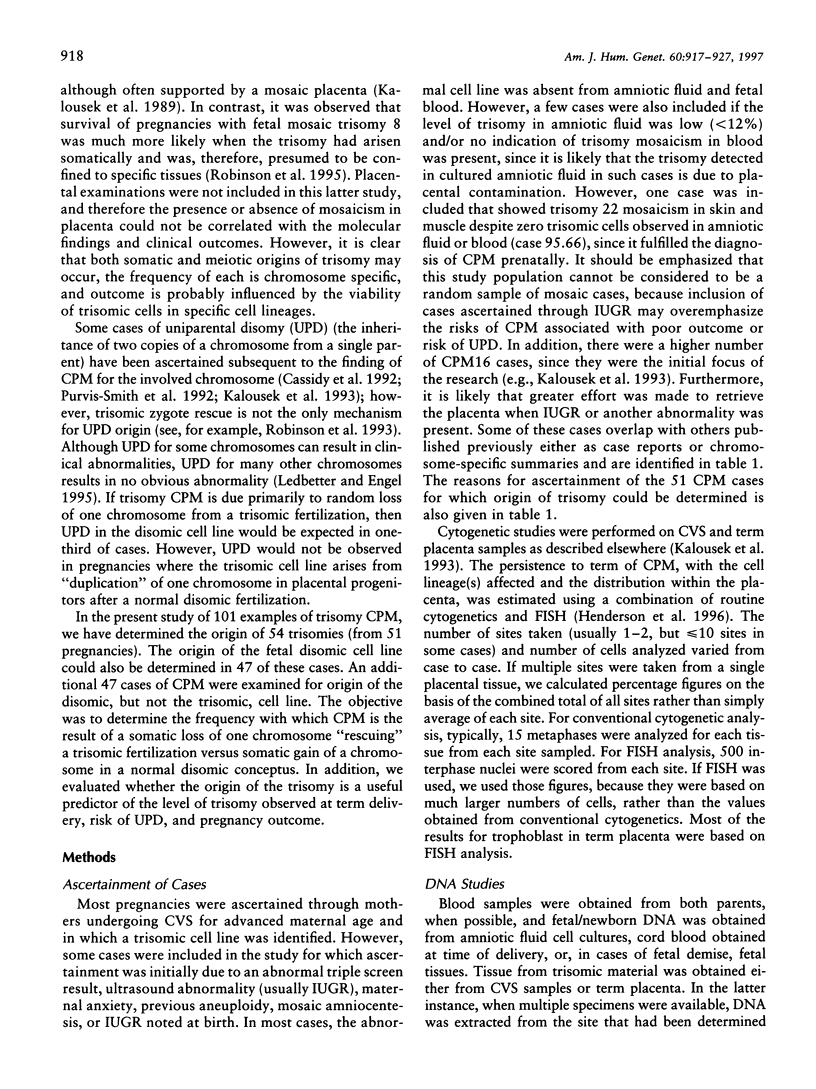
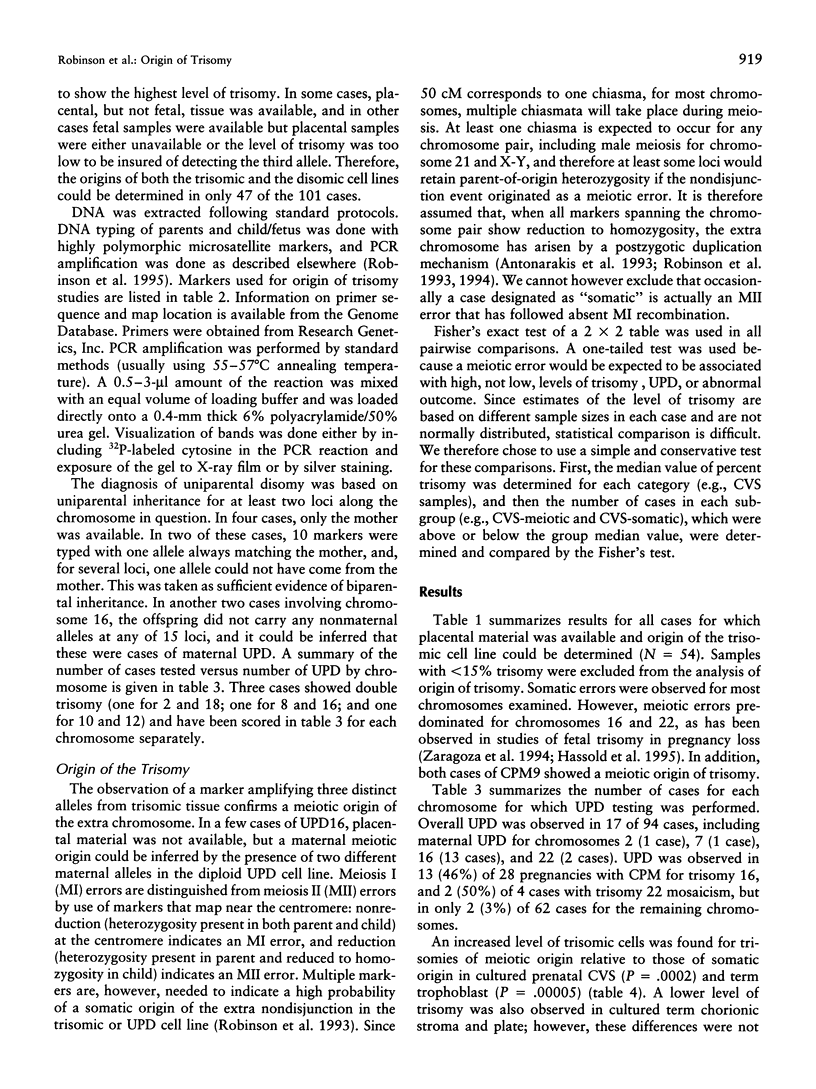
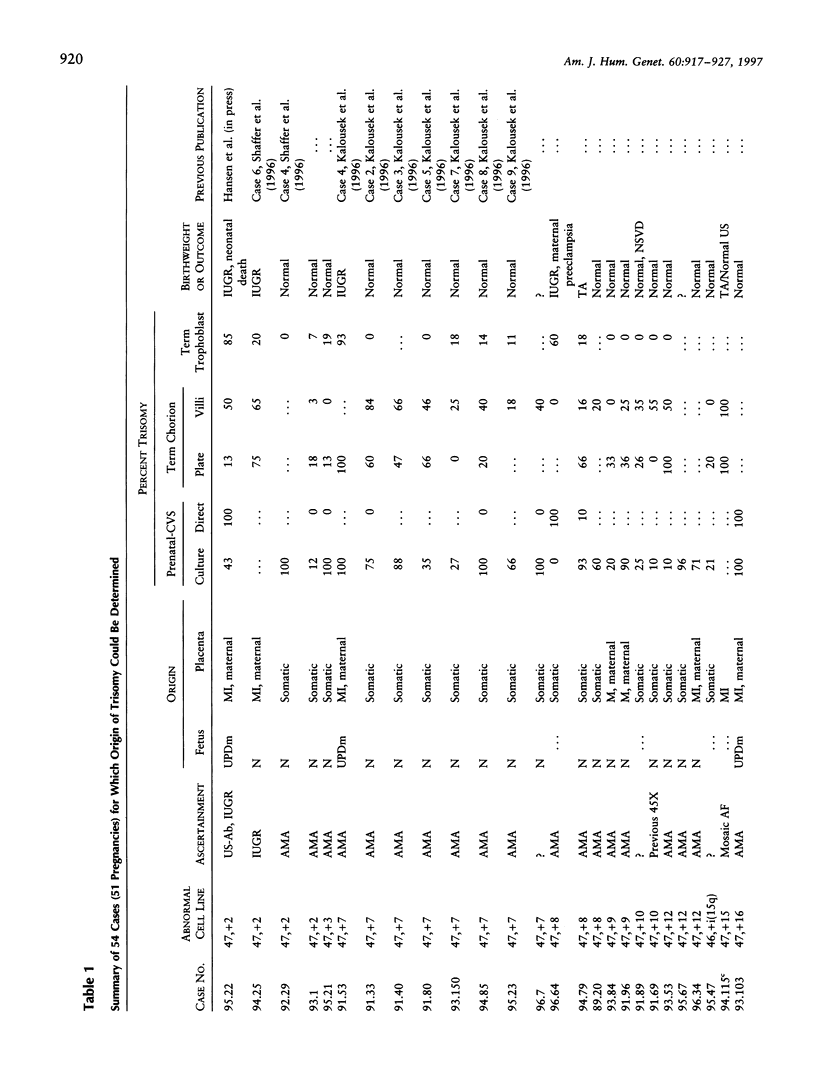
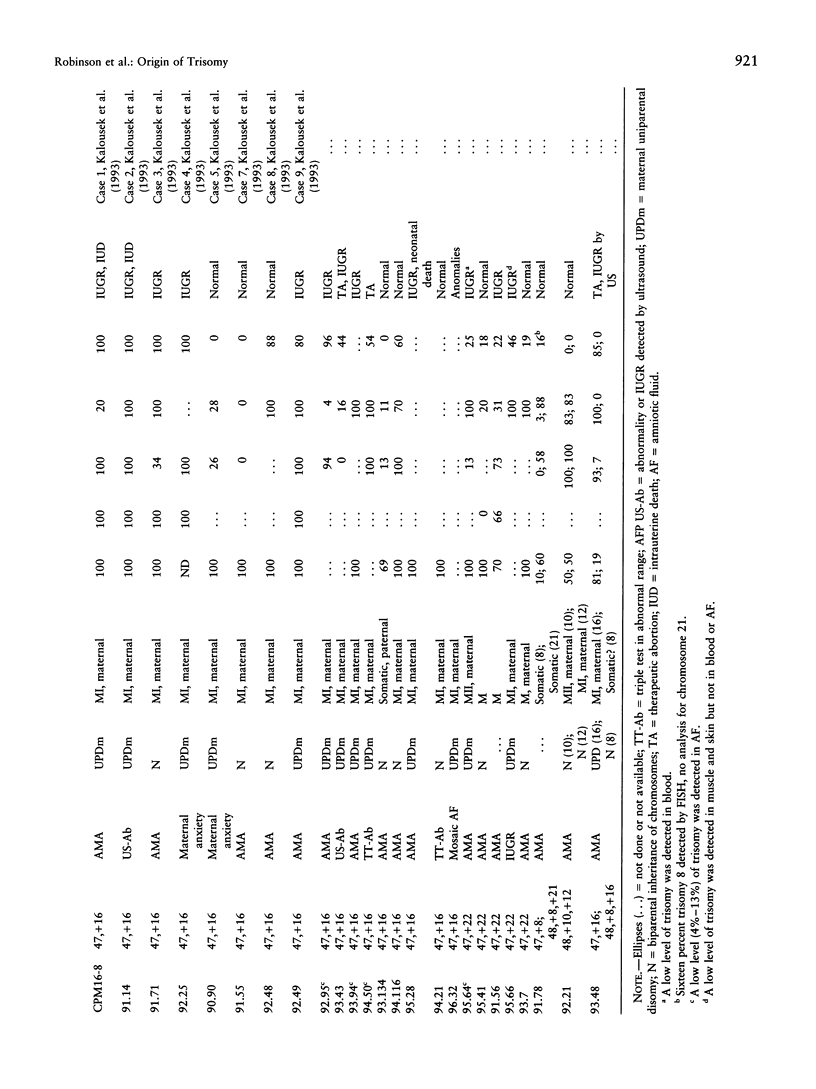


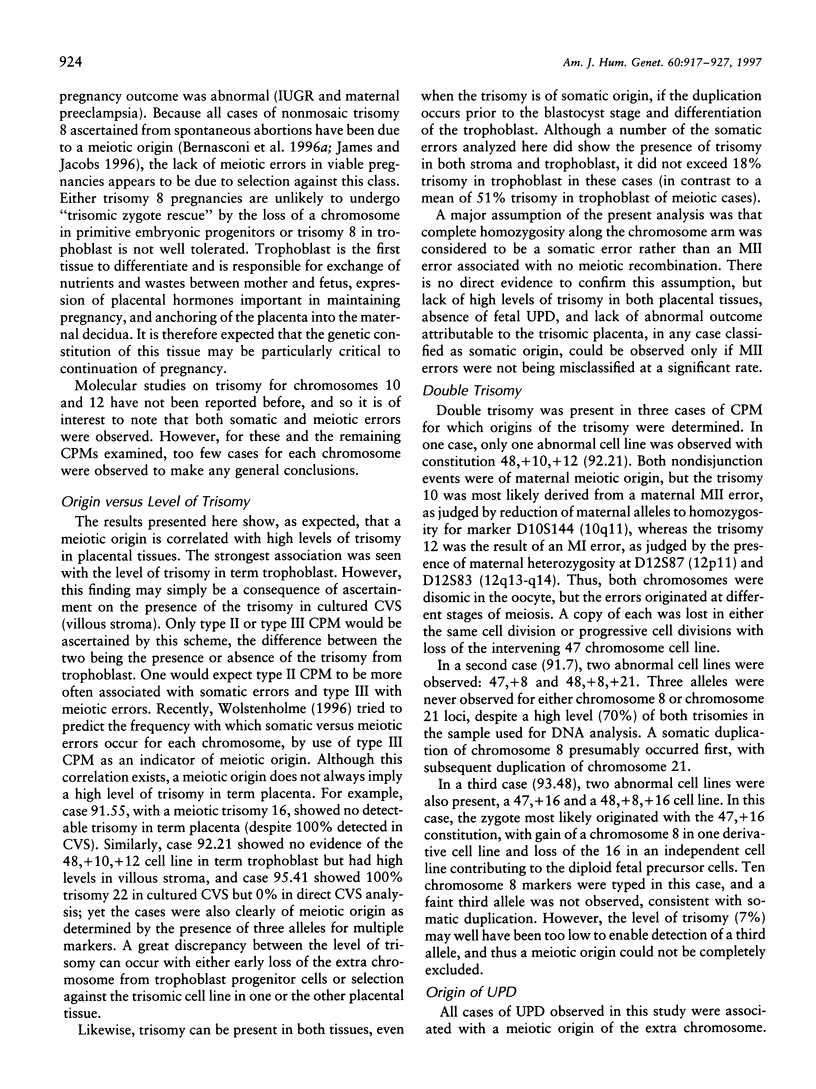


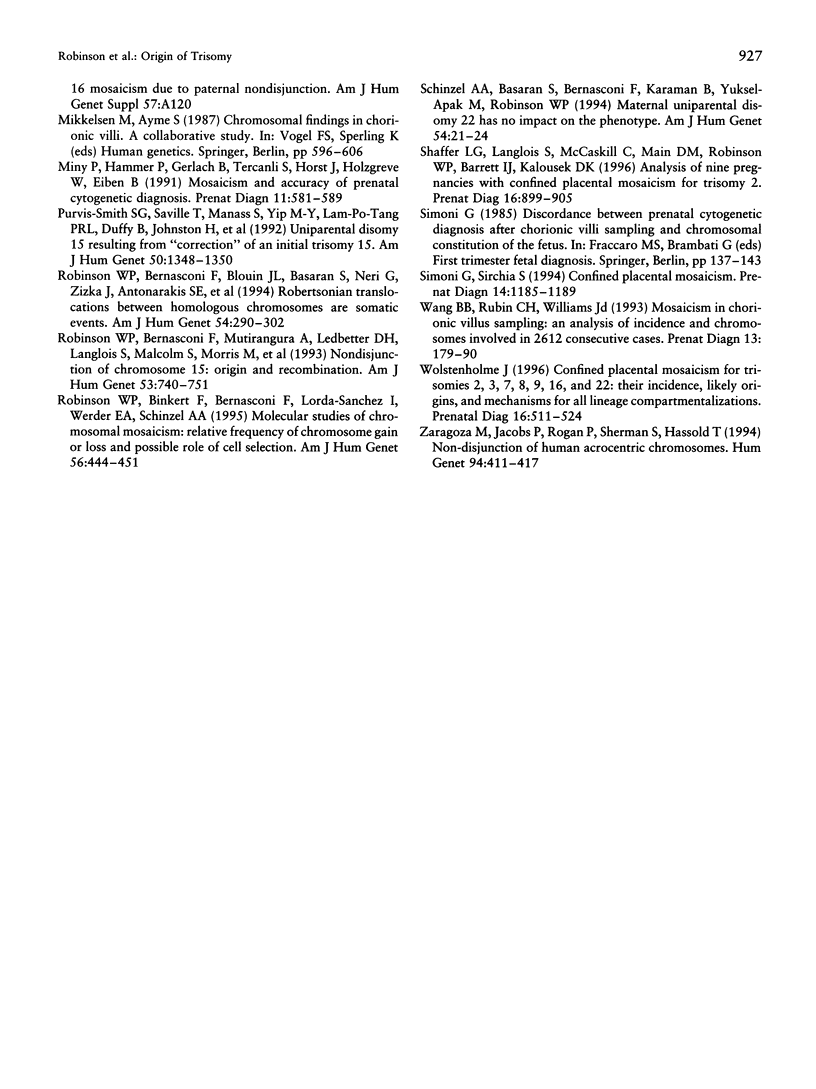
Selected References
These references are in PubMed. This may not be the complete list of references from this article.
- Antonarakis S. E., Avramopoulos D., Blouin J. L., Talbot C. C., Jr, Schinzel A. A. Mitotic errors in somatic cells cause trisomy 21 in about 4.5% of cases and are not associated with advanced maternal age. Nat Genet. 1993 Feb;3(2):146–150. doi: 10.1038/ng0293-146. [DOI] [PubMed] [Google Scholar]
- Bernasconi F., Karagüzel A., Celep F., Keser I., Lüleci G., Dutly F., Schinzel A. A. Normal phenotype with maternal isodisomy in a female with two isochromosomes: i(2p) and i(2q) Am J Hum Genet. 1996 Nov;59(5):1114–1118. [PMC free article] [PubMed] [Google Scholar]
- Cassidy S. B., Lai L. W., Erickson R. P., Magnuson L., Thomas E., Gendron R., Herrmann J. Trisomy 15 with loss of the paternal 15 as a cause of Prader-Willi syndrome due to maternal disomy. Am J Hum Genet. 1992 Oct;51(4):701–708. [PMC free article] [PubMed] [Google Scholar]
- Christian S. L., Smith A. C., Macha M., Black S. H., Elder F. F., Johnson J. M., Resta R. G., Surti U., Suslak L., Verp M. S. Prenatal diagnosis of uniparental disomy 15 following trisomy 15 mosaicism. Prenat Diagn. 1996 Apr;16(4):323–332. doi: 10.1002/(SICI)1097-0223(199604)16:4<323::AID-PD856>3.0.CO;2-5. [DOI] [PubMed] [Google Scholar]
- Eggerding F. A., Schonberg S. A., Chehab F. F., Norton M. E., Cox V. A., Epstein C. J. Uniparental isodisomy for paternal 7p and maternal 7q in a child with growth retardation. Am J Hum Genet. 1994 Aug;55(2):253–265. [PMC free article] [PubMed] [Google Scholar]
- Harrison K., Eisenger K., Anyane-Yeboa K., Brown S. Maternal uniparental disomy of chromosome 2 in a baby with trisomy 2 mosaicism in amniotic fluid culture. Am J Med Genet. 1995 Aug 28;58(2):147–151. doi: 10.1002/ajmg.1320580211. [DOI] [PubMed] [Google Scholar]
- Hassold T., Merrill M., Adkins K., Freeman S., Sherman S. Recombination and maternal age-dependent nondisjunction: molecular studies of trisomy 16. Am J Hum Genet. 1995 Oct;57(4):867–874. [PMC free article] [PubMed] [Google Scholar]
- Henderson K. G., Shaw T. E., Barrett I. J., Telenius A. H., Wilson R. D., Kalousek D. K. Distribution of mosaicism in human placentae. Hum Genet. 1996 May;97(5):650–654. doi: 10.1007/BF02281877. [DOI] [PubMed] [Google Scholar]
- James R. S., Jacobs P. A. Molecular studies of the aetiology of trisomy 8 in spontaneous abortions and the liveborn population. Hum Genet. 1996 Mar;97(3):283–286. doi: 10.1007/BF02185754. [DOI] [PubMed] [Google Scholar]
- Kalousek D. K., Barrett I. J., McGillivray B. C. Placental mosaicism and intrauterine survival of trisomies 13 and 18. Am J Hum Genet. 1989 Mar;44(3):338–343. [PMC free article] [PubMed] [Google Scholar]
- Kalousek D. K., Barrett I. Confined placental mosaicism and stillbirth. Pediatr Pathol. 1994 Jan-Feb;14(1):151–159. doi: 10.3109/15513819409022034. [DOI] [PubMed] [Google Scholar]
- Kalousek D. K., Dill F. J. Chromosomal mosaicism confined to the placenta in human conceptions. Science. 1983 Aug 12;221(4611):665–667. doi: 10.1126/science.6867735. [DOI] [PubMed] [Google Scholar]
- Kalousek D. K., Dill F. J., Pantzar T., McGillivray B. C., Yong S. L., Wilson R. D. Confined chorionic mosaicism in prenatal diagnosis. Hum Genet. 1987 Oct;77(2):163–167. doi: 10.1007/BF00272385. [DOI] [PubMed] [Google Scholar]
- Kalousek D. K., Howard-Peebles P. N., Olson S. B., Barrett I. J., Dorfmann A., Black S. H., Schulman J. D., Wilson R. D. Confirmation of CVS mosaicism in term placentae and high frequency of intrauterine growth retardation association with confined placental mosaicism. Prenat Diagn. 1991 Oct;11(10):743–750. doi: 10.1002/pd.1970111002. [DOI] [PubMed] [Google Scholar]
- Kalousek D. K., Langlois S., Barrett I., Yam I., Wilson D. R., Howard-Peebles P. N., Johnson M. P., Giorgiutti E. Uniparental disomy for chromosome 16 in humans. Am J Hum Genet. 1993 Jan;52(1):8–16. [PMC free article] [PubMed] [Google Scholar]
- Kalousek D. K., Langlois S., Robinson W. P., Telenius A., Bernard L., Barrett I. J., Howard-Peebles P. N., Wilson R. D. Trisomy 7 CVS mosaicism: pregnancy outcome, placental and DNA analysis in 14 cases. Am J Med Genet. 1996 Nov 11;65(4):348–352. doi: 10.1002/(SICI)1096-8628(19961111)65:4<348::AID-AJMG19>3.0.CO;2-U. [DOI] [PubMed] [Google Scholar]
- Kotzot D., Schmitt S., Bernasconi F., Robinson W. P., Lurie I. W., Ilyina H., Méhes K., Hamel B. C., Otten B. J., Hergersberg M. Uniparental disomy 7 in Silver-Russell syndrome and primordial growth retardation. Hum Mol Genet. 1995 Apr;4(4):583–587. doi: 10.1093/hmg/4.4.583. [DOI] [PubMed] [Google Scholar]
- Langlois S., Yong S. L., Wilson R. D., Kwong L. C., Kalousek D. K. Prenatal and postnatal growth failure associated with maternal heterodisomy for chromosome 7. J Med Genet. 1995 Nov;32(11):871–875. doi: 10.1136/jmg.32.11.871. [DOI] [PMC free article] [PubMed] [Google Scholar]
- Ledbetter D. H., Engel E. Uniparental disomy in humans: development of an imprinting map and its implications for prenatal diagnosis. Hum Mol Genet. 1995;4(Spec No):1757–1764. doi: 10.1093/hmg/4.suppl_1.1757. [DOI] [PubMed] [Google Scholar]
- Miny P., Hammer P., Gerlach B., Tercanli S., Horst J., Holzgreve W., Eiben B. Mosaicism and accuracy of prenatal cytogenetic diagnoses after chorionic villus sampling and placental biopsies. Prenat Diagn. 1991 Aug;11(8):581–589. doi: 10.1002/pd.1970110815. [DOI] [PubMed] [Google Scholar]
- Purvis-Smith S. G., Saville T., Manass S., Yip M. Y., Lam-Po-Tang P. R., Duffy B., Johnston H., Leigh D., McDonald B. Uniparental disomy 15 resulting from "correction" of an initial trisomy 15. Am J Hum Genet. 1992 Jun;50(6):1348–1350. [PMC free article] [PubMed] [Google Scholar]
- Robinson W. P., Bernasconi F., Basaran S., Yüksel-Apak M., Neri G., Serville F., Balicek P., Haluza R., Farah L. M., Lüleci G. A somatic origin of homologous Robertsonian translocations and isochromosomes. Am J Hum Genet. 1994 Feb;54(2):290–302. [PMC free article] [PubMed] [Google Scholar]
- Robinson W. P., Bernasconi F., Mutirangura A., Ledbetter D. H., Langlois S., Malcolm S., Morris M. A., Schinzel A. A. Nondisjunction of chromosome 15: origin and recombination. Am J Hum Genet. 1993 Sep;53(3):740–751. [PMC free article] [PubMed] [Google Scholar]
- Robinson W. P., Binkert F., Bernasconi F., Lorda-Sanchez I., Werder E. A., Schinzel A. A. Molecular studies of chromosomal mosaicism: relative frequency of chromosome gain or loss and possible role of cell selection. Am J Hum Genet. 1995 Feb;56(2):444–451. [PMC free article] [PubMed] [Google Scholar]
- Schinzel A. A., Basaran S., Bernasconi F., Karaman B., Yüksel-Apak M., Robinson W. P. Maternal uniparental disomy 22 has no impact on the phenotype. Am J Hum Genet. 1994 Jan;54(1):21–24. [PMC free article] [PubMed] [Google Scholar]
- Shaffer L. G., Langlois S., McCaskill C., Main D. M., Robinson W. P., Barrett I. J., Kalousek D. K. Analysis of nine pregnancies with confined placental mosaicism for trisomy 2. Prenat Diagn. 1996 Oct;16(10):899–905. doi: 10.1002/(SICI)1097-0223(199610)16:10<899::AID-PD960>3.0.CO;2-M. [DOI] [PubMed] [Google Scholar]
- Simoni G., Sirchia S. M. Confined placental mosaicism. Prenat Diagn. 1994 Dec;14(13):1185–1189. doi: 10.1002/pd.1970141304. [DOI] [PubMed] [Google Scholar]
- Wang B. B., Rubin C. H., Williams J., 3rd Mosaicism in chorionic villus sampling: an analysis of incidence and chromosomes involved in 2612 consecutive cases. Prenat Diagn. 1993 Mar;13(3):179–190. doi: 10.1002/pd.1970130305. [DOI] [PubMed] [Google Scholar]
- Wolstenholme J. Confined placental mosaicism for trisomies 2, 3, 7, 8, 9, 16, and 22: their incidence, likely origins, and mechanisms for cell lineage compartmentalization. Prenat Diagn. 1996 Jun;16(6):511–524. doi: 10.1002/(SICI)1097-0223(199606)16:6<511::AID-PD904>3.0.CO;2-8. [DOI] [PubMed] [Google Scholar]
- Zaragoza M. V., Jacobs P. A., James R. S., Rogan P., Sherman S., Hassold T. Nondisjunction of human acrocentric chromosomes: studies of 432 trisomic fetuses and liveborns. Hum Genet. 1994 Oct;94(4):411–417. doi: 10.1007/BF00201603. [DOI] [PubMed] [Google Scholar]


